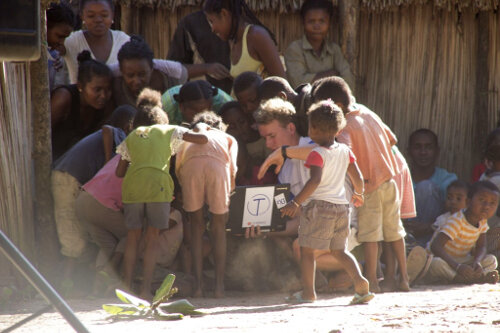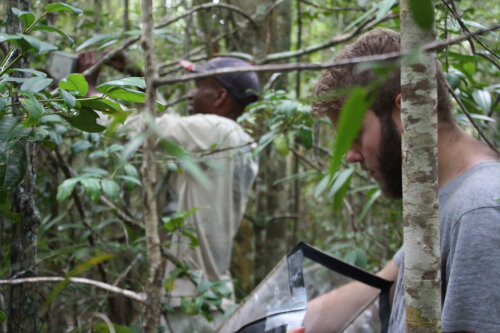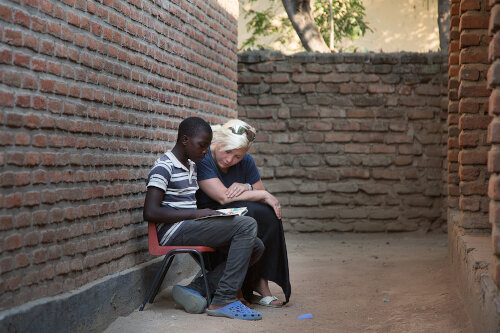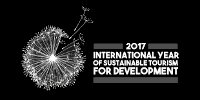Volunteering: 7 Tips on How to Choose Ethical & Responsible Volunteer Tourism
/The 5th of December is UN International Volunteer Day. It is a chance for volunteers and organisations to celebrate their efforts, to share their values, and to promote their work among their communities, NGOs, government authorities and the private sector. It recognises volunteers worldwide and all they do in making peace and sustainable development a reality, and reducing inequality within and among countries.
“The diverse and dynamic role of volunteerism in promoting the Sustainable Development Goals merits strong support from Governments and other stakeholders. On this International Day, I thank volunteers for their efforts to leave no one behind.” - António Guterres, UN Secretary-General
It’s a subject close to the heart of Earth Changers Founder Vicky Smith, who has worked in volunteer tourism since 2006 and wrote her Masters thesis on the subject. Ultimately, her study led her to understand that the vast majority (maybe 95%?!) of volunteer tourism - or ‘voluntourism’ - is not ethical, responsible or sustainable, largely created to fulfil western desires rather than local needs, exploiting for a profit for external parties. So you won’t see much Earth Changers volunteer tourism: the little that you do, you know will be ethical. Below, we use images of ethical placements rather than marketing irresponsible practice - can you see a difference?
You might also like to read: The Future of…Community Tourism: Top 10 Tips for Ethical Volunteering & Community-Based Travel
Ethical Volunteering: How do we tell?
Referencing Vicky’s study, the following is an edited extract from Learning Service: The Essential Guide to Volunteering Abroad, written by Claire Bennett, Joseph Collins, Zahara Heckscher and Daniela Papi-Thornton.
Volunteer Tourism: Watch out for Red Flags in Marketing Materials
The lines between traditional tourism and impact-driven volunteering are increasingly blurred these days, especially in the way they are marketed,
“A nicely turned out brochure does not a reputable organisation make.”
Many companies choose to market volunteer opportunities in a way that promotes a rather lopsided and simplistic view of complicated issues like development, poverty, and aid. These companies shy away from opening up debates on these complexities, because it is in their interests to convince as many people as possible to sign up, not deter customers by revealing complexity.
Vicky Smith’s study of volunteer travel marketing explored volunteers’ reactions to the language used by volunteer programs, noting that “volunteers felt impressed by the density of buzzwords used in the marketing materials, but there was little evidence of these volunteers searching for evidence of how the volunteer project went about achieving their claims.”
The study showed how it is easy for providers to make attractive claims if potential volunteers do not do the research to substantiate them. Volunteers may start to question if the experience they were sold matches the situation on the ground only once they are overseas—and by then it is too late. And generally, organisations that prioritise responsible volunteering are more likely to prioritise responsible marketing.
Organisations that include information about learning goals and self-development as well as the long-term impact volunteers can make throughout their lives might align more closely with the learning service philosophy. Potential volunteers should seek organisations that have honest, transparent and non-sensationalist materials that avoid any of the following tactics:
1) Irresponsible Volunteer Tourism Over-emphasises The “Need” for Volunteers
Marketing materials that highlight an organisation’s desperate need for volunteers raises two red flags. One is a sustainability issue: filling vital roles with international volunteers will hinder their ability to provide reliable and high-quality service. In addition, some companies emphasise a critical “need” for volunteers purely as a marketing tool, when the reality in many placements is that volunteers are at best superfluous additions, and at worst extra visitors to be entertained. If you are considering a volunteering option that is advertising a need, ask who has identified the need, and why and how international volunteers are being used to fill it.
In Madagasar (image below), the charity works with local communities to identify needs, scope out projects to support the need, and seeks donors to support the projects. Local staff with qualified long-term intern support implement the projects, with some hands-on help provided by short-term volunteers .
2) Irresponsible Volunteer Tourism Fuels Sympathy instead of Empathy
Much of the advertising for volunteer travel is designed to create sympathy, presenting people overseas as helpless victims waiting for a saviour. This to be a poor substitute for another emotion that is more likely to drive real change: empathy.
While sympathy builds a desire to help, empathy builds a desire to understand, and only through that understanding are we able to contribute our support most wisely. Natalia Gligor, who volunteered for over a month in an orphanage in Nepal, realises that sympathy can lead to bad decisions:
“People feel such pity for children from poor countries, and sometimes feel like doing something about it—having the purest intentions. But it allows individuals… to grow a big business based on children from less privileged families.”
In order to be able to understand what it is like to walk in someone else’s shoes, you need to understand what those shoes are like. It is easier to build empathy for people who are similar to yourself and harder when you have few shared experiences. To build empathy for local people, you need to respect and get to know them, not pity them, so look for marketing that seems to offer a chance to share, exchange and learn with local people, rather than save them.
3) Irresponsible Volunteer Tourism Portrays Poverty Porn
“Poverty porn”, the more attention-grabbing name of “poverty voyeurism”, is the practice of using images of poverty unethically. Examples include fundraising or volunteer recruitment materials that have images of run down homes, malnourished and crying babies, or women carrying water on their heads through parched fields, perhaps with an audio voice over giving you shocking statistics and messages about people who “have no voice.” Such imagery often relies on a simplistic view of poverty, falling back on old stereotypes, and can be extremely damaging.
Learning service means travelling to learn about and understand complex global issues, with a view to taking future action to address them. This is very different from coming to simply observe people facing those issues as part of their daily lives because they seem exotic. Poverty voyeurism is patronising and exploitative. Seriously question organisations that sell viewing poverty as exciting, or that use disempowering images of local people.
4) Irresponsible Volunteer Tourism Portrays The Saviour/Hero Dynamic
Another red flag in marketing is when volunteers are presented as the heroes of the story. While of course there are heroic people doing unpaid work all over the world, not all volunteering is necessarily heroic.
The media tends to venerate the celebrities who turn up to lend a hand in disaster areas, or the “everyday heroes” who drop everything to rush overseas to help. The most sensationalist stories focus on aspects such as the distance they had to travel, the barriers they had to overcome, the limited planning they had done, or how young they are. Unlike the qualities that are more likely to make a project successful – careful planning and resourcing – naiveté itself often gets celebrated.
The real harm in the saviour myth is the idea that the lack of learning, preparation, and self-reflection is a necessary rite-of-passage for the volunteer hero. In order to be “heroic,” a volunteer needs to be presented as charting unknown waters when they set out to help overseas. The media celebrates their experiments, thereby encouraging more under-prepared copycats, instead of urging people to learn from the tens of thousands of past volunteers who have gone before them. In short, if society continues to reward intention rather than results, wasteful actions will continually be incentivised.
If the only stories told on a website are from foreign volunteers, or if the images are all about the visiting traveller saving the day, it is likely a misrepresentation that excludes the main actors—the local people tirelessly working for change within their own communities.
In Malawi, you can join a team of women on a journey to link you with inspirational Malawian women, challenge you and, as experienced professionals, help empower and support local entrepreneurs and youths. You’ll be connected in advance and continue your skillshare after your return.
5) Irresponsible Volunteer Tourism Sets up Unrealistic Expectations
Question any marketing that suggests that making an impact will be easy or have immediate effect.
Long-term social change, such as improving education systems or increasing incomes, is a slow and multi-layered process, in which outsiders can usually play only a minor role. False marketing of inflated impacts can set you up for failure from the outset. Blogger Rachel, whose post about volunteering in Nepal went viral, wrote,
“We were in an area where nobody needed us, and where we could make little to no difference. We couldn’t speak the language and had been told beforehand that it wasn’t necessary, so we had next to no input. I felt useless.”
Look out for organisations that recognise that the problems being tackled are complex, and that whatever skills and experience a volunteer might bring, they are only a small part of a wider solution.
6) Irresponsible Volunteer Tourism Overuses the Language of Tourism
Although it is fair to recognise that volunteer travellers are still travellers, and therefore interested in the sites and attractions of the country they are placed in, it is a red flag when a volunteer placement is primarily advertised using the language and imagery of tourism.
If you find yourself drawn to the descriptions of travel adventures, maybe that’s what you need and want—an adventure holiday.
Rather, you could choose an organisation marketing an interesting, responsible volunteer position and work out other travel plans before or after.
Whatever you do, don’t conflate the two: your zip-line jungle tour will indeed be a fun and adventurous activity but don’t fall for the marketing that makes out that the day you spend teaching in a school is the main point of your trip!
7) Irresponsible Volunteer Tourism = The “All-Inclusive Buffet”
Beware of companies offering the “all-inclusive volunteer buffet.”
Just like in an all-you-can-eat restaurant, where you can never tell which food items are freshly-cooked, question travel companies that offer do-everything-go-everywhere volunteer options, with placements all over the world that start any time you like.
Creating a volunteer placement that is beneficial to both the local community and to travellers is extremely challenging, even in one location.
To do that well all around the world is nearly impossible. Broadly, our recommendation is to avoid any organisation that sells trips to dozens of locations rather than a selection of strategic partnerships, does not do any volunteer matching, or has commoditised volunteering to the point where they are offering one-click purchasing or “discount volunteer placements.”
Going abroad with one of these high-volume discount providers and getting an unvetted placement may have even greater repercussions than getting a dish of salmonella from the buffet.
Whether adventure sailing, citizen science volunteering, or hard science with institutions, these sailing trips (image above) are all focused from an ethos of ocean conservation and education.
Learn more:
Earth Changers’ Founder Vicky Smith’s published Masters paper is available here: Volunteer tourism, greenwashing and understanding responsible marketing using market signalling theory.
With a follow up study here: Marketing and communication of responsibility in volunteer tourism.
Learning Service: The Essential Guide to Volunteer Travel is available to purchase online and in bookshops worldwide. You can also find out more about Learning Service from their website: www.learningservice.info or follow them on Facebook, Twitter or Instagram.
Look out for more blogs coming…




















